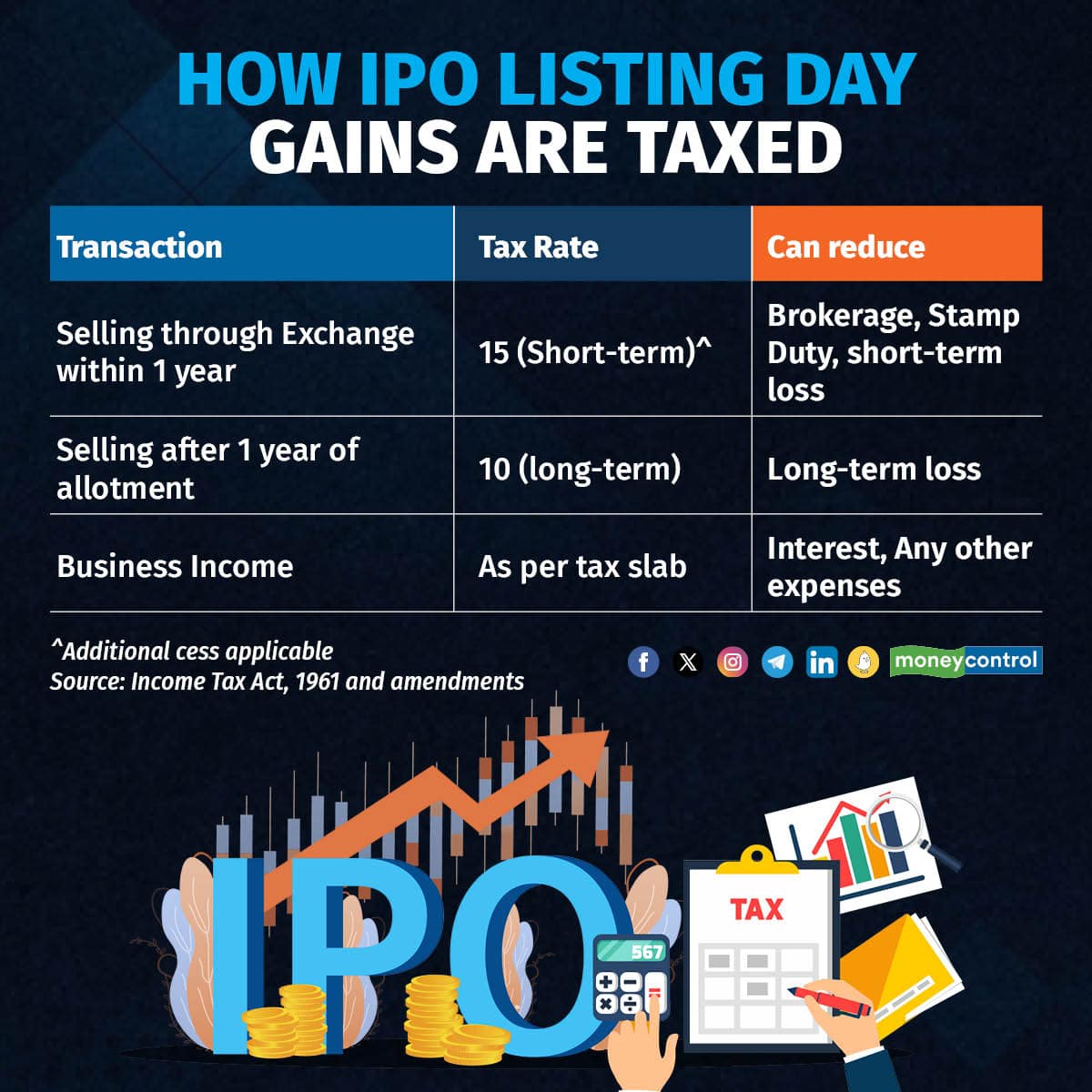
Massive listing gains have recently been witnessed on initial public offerings (IPO) by Tata Technologies (140-180 percent) and Indian Renewable Energy Development Agency (87.5 percent). The issue price of Tata Technologies was Rs 500. On December 4, the stock opened at Rs 1,192.05 (touching Rs 1,400 on December 1). The issue price of Indian Renewable Development Agency was Rs 32. On December 4, the share opened at Rs 65.15.
Calendar year 2023 has seen at least 15 stocks being listed after an exuberant 80-100 percent surge on their listing day, after a company sells its shares to the public for the first time in an IPO.
If you exited the stock after making a profit on listing day, understand the tax implications on the gains made within a day of holding the stock. Even though these stocks are taxed just like any other listed stock, the buying circumstances affect the taxability.
Taxation rates
Since you sold the shares within a year of being allotted, the profits from the share sale will be taxed as a short-term capital gain. So, you will have to pay a tax of 15 percent plus education and higher education cess.
 Taxation of equity shares
Taxation of equity shares
The tax will be a lower 10 percent if you hold these shares for one year or beyond. Hence, Tata Technologies shares purchased during the IPO would turn long-term by November 29, 2024, unlike unlisted shares, which are considered long-term only after 3 years.
Low-income earners
Many senior citizens and low-income earners applied for this IPO. Under the rules, the basic exemption limit is Rs 2.5 lakh for ordinary citizens, Rs 3 lakh for senior citizens (60-80 years) and Rs 5 lakh for super senior citizens (80 years and above). In simple words, if your income is below this limit, you do not have to pay any income tax.
Also read: Is the Rs 7 lakh tax-free income limit only for new income-tax regime?
If you are a senior citizen or a super senior citizen and if your listing day gains are below the threshold, you do not have to pay any income tax on the sale of your shares.
Just remember: you can’t adjust against this basic exemption if you are a non-resident Indian.
What can you reduce from the profits?
The good news is that you can deduct some charges and other specific losses to reduce the overall tax on the profit amount. For individual investors, the application money is not taxable as income.
The brokerage paid can be deducted from the profit for taxation purposes. Alternatively, if you have made a loss while selling any other asset, you can adjust the same from the IPO profit.
Adjusting any loss
If you have incurred any other loss during the year by selling shares or any other capital asset, then you can adjust the same loss against this profit that you earn on the Tata Technologies shares, which doubled within a day of holding.
“The shares were credited two days prior to the listing. Since you held it for less than one year you will pay short-term capital gain. You can adjust any short-term capital loss made earlier between April-November 2023 against this short-term capital gain,” says Mumbai-based chartered accountant Mehul Sheth.
However, if you have incurred a long-term loss, it can only be adjusted against a long-term profit.
No threshold benefit
Apart from the lower tax rate, there are many benefits to holding assets for one year or more. An important one is that profits up to Rs 1 lakh are shielded from tax if you hold them for one year (long-term).
This benefit is not available if you sell within a year (short-term). Hence, short-term capital gains would be charged on every penny earned if you sell on the listing day, when the Tata Technologies stock doubled.
Purchasing IPO shares using borrowed capital
The income tax lens also changes if you frequently invest in IPOs using loans. “If it is established that you borrow money and invest in IPOs then the income tax department can claim that it is a business income that you have made by investing in the IPO,” says Ameet Patel, partner at Manohar Chowdhry & Associates.
If you have earned business income, you must remember that the tax applicable on the share sale will be as per your tax slab and not as per the short-term rate of 15 percent. Many traders do not declare that they are traders by profession.
If you adjust interest payment against the short-term profit earned then there is a risk of being caught as a trader. “But if you have been filing returns and declared trading/ investments as your business then you can deduct interest paid for borrowing money to invest in an IPO (up to the date of allotment) as an expense from the gains,” says Patel.
But adjustment of any capital loss will be tricky in that circumstance as it can’t be set off against business income then.
Pay your taxes on time, or else…
You can only claim all the benefits of deducting expenses from IPO gains if you file your tax returns on time—usually by July 31 each year. You also cannot use the simple tax return forms of ITR–1 and ITR–4 if you have a capital gain to declare and adjust.
Check Free Credit Score on Moneycontrol: Easily track your loans, get insights, and enjoy a ₹100 cashback on your first check!